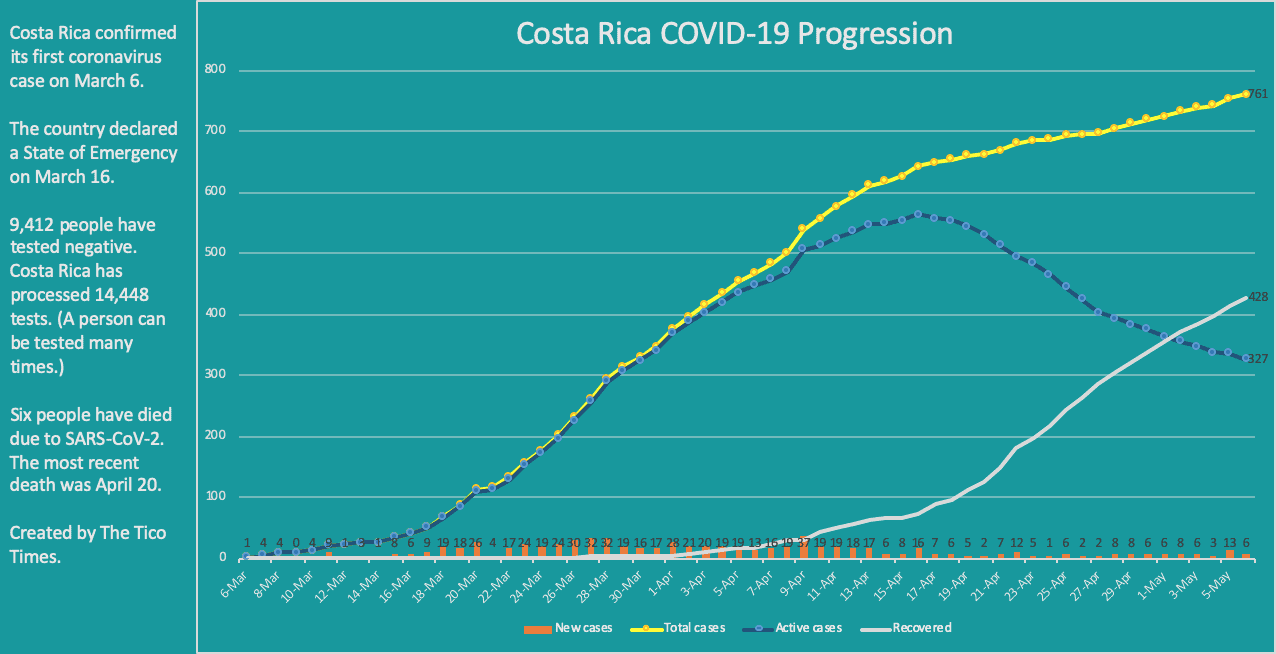Costa Rica confirmed six new cases of the coronavirus over the past day, totaling 761 cumulative known cases, the Health Ministry announced Wednesday afternoon.
Over the same period, 15 more people recovered from COVID-19, leaving Costa Rica with 428 total recoveries and 327 active cases. The data mean Costa Rica has registered its 20th-straight day-over-day decrease in known active coronavirus cases.
Six people have died after contracting the coronavirus, and 18 people are currently hospitalized with COVID-19 or complications. Five of them are in intensive care with an age range of 57 to 75 years old.
Below is a map of active cases by canton. Click on a blue marker for more information, including total cumulative cases and recoveries for that location.
Costa Rica details testing strategy
Costa Rica has processed a total of 14,448 diagnostic tests for SARS-CoV-2 (327 more than Tuesday), which corresponds to 2,827 tests per 1 million people.
After Salvadoran president Nayib Bukele criticized Costa Rica’s testing strategy, Health Minister Daniel Salas defended the country’s methodology during Wednesday’s press conference.
Salas said Costa Rica’s protocols are as follows:
- Costa Rica tests everyone who qualifies as a suspected coronavirus case and has adopted a “sensible” definition of suspected cases based on World Health Organization guidelines.
- Costa Rica conducts aggressive testing in high-density locales — including call centers and homes for the elderly.
- Costa Rica now tests 100% of repatriated citizens, in addition to issuing them mandatory 14-day isolation orders.
- Costa Rica conducts sentinel tests for the novel coronavirus and other viruses at 18 different locations nationally. Of the 442 people tested in this capacity over the last two weeks, just two returned positive for SARS-CoV-2.
- Costa Rica conducts proactive testing in 33 identified risk areas — where there is either a high population density and/or high migratory flow. Authorities have tested 990 asymptomatic people in this capacity.
Based on the percentage of new tests that return positive (about 6%, according to Salas), the relatively low hospitalization rate, and the results of the sentinel tests, Costa Rica does not have widespread community transmission, Salas said.
If you believe you may have contracted the coronavirus or have questions regarding the virus, contact Costa Rican health authorities by dialing 1322.
Timeline of COVID-19 in Costa Rica
- March 6: Costa Rica confirms first COVID-19 case.
- March 9: Costa Rica suspends mass gatherings, tells employees to work from home.
- March 16: Costa Rica declares State of Emergency, restricts entry to non-citizens
- and non-residents. In-person teaching suspended.
- March 18: Costa Rica reports first COVID-19-related death.
- March 20: Costa Rica reports second COVID-19-related death. All national parks close.
- March 23: Beaches and religious centers ordered to close. Nighttime driving ban announced.
- March 31: Costa Rica inaugurates coronavirus-specific hospital at CENARE.
- April 4-12: Costa Rica imposes significant travel restrictions during Semana Santa.
- April 15: Costa Rica reports fourth COVID-19-related death.
- April 17: Costa Rica registers first day-over-day decrease in known active coronavirus cases. This trend continues for the next two weeks.
- April 19: Costa Rica reports fifth COVID-19-related death.
- April 20: Costa Rica reports sixth COVID-19-related death.
- May 1: Costa Rica begins easing coronavirus measures.
Costa Rica is enforcing nationwide driving restrictions through May 15. Click here for full details.
Most flights between the U.S. and Costa Rica have ceased, but United Airlines will resume limited commercial service in early May. Click here for more details.






